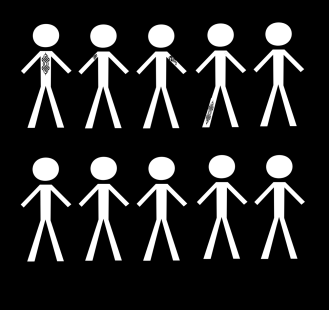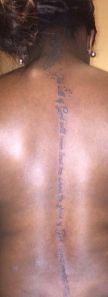Tattoos and piercings have different meanings for many people. People have debated for a number of years if tattoos are acceptable in the workplace. The issue has a number of dimensions.

Although nearly 40 percent among those ages 18 to 29 have tattoos, according to Pew Research, having tattoos is not socially accepted. Sometimes, customers and employers see employees or potential-employees with tattoos on their arms and faces and assume they just got out of jail or their probation officer helped them get the job. Some people are quick to judge because of where the tattoo is places on the person’s body.
People may feel offended and chose not to shop at stores where employees have tattoos and piercing. For this reason, many people with tattoos cover them when they are at work or, at the very least, while they are interviewing for a job. This is particularly the case in typically conservative industries, such as accounting or banking.
Tyree Barnes works at Merion Golf Club and has to cover his tattoos.
“I’m not really too sure about piercings, but I do have tattoos all over my arms and chest,” Barnes said. “I work at Merion Golf Course in Ardmore, Pa. It’s one of the top golf courses in the world, which causes me to wear khakis shorts and a white shirt.”
Barnes’ employer was fine with him getting tattoos until they became visible to customers.
“When I first started, I didn’t have any tattoos at all, but now I have over 15 all over my arms and chest,” Barnes said. “Once I started getting tattoos below the sleeve of my shirt, my boss told me I can either wear a long sleeve shirt or buy those sports basketball sleeves. I didn’t have a problem with that at all.”
Piercings can also impact employability. This is one reason why Francesca Formisano, an exercise science and health promotion major, tries to keep hers tasteful. Formisano works at the fitness center at Cabrini University with Dustin Malandra, the head strength and conditioning coach.
“I like to keep all my piercings in the same ear, all the same size little diamonds, so they don’t look trashy and try and keep it classy,” Formisano said. “I find that some people do look at me funny when they see all my piercings but the jobs that I hold on campus now do not have a problem with them.”
Though some organizations still consider tattoos to be taboo, some do not mind at all.
“In my field, I haven’t had any problems with the earrings with potential internships,” Formisano said. “The one I’m at now doesn’t have a problem with them; same with the tattoos. Mine are small and can be hidden but when I was applying for a job at Gap, they told me that the one on my ankle was fine if it was seen because tattoos have become such a mainstream thing that most people have.”

In addition to tattoos and piercings, unnatural hair colors can prevent individuals from getting employed. Danielle Jackson, a computer science and technology major currently working at Rita’s Water Ice and at Flynn O’Hara Uniform Store has more trouble with her hair than with tattoos and piercings.
“My bosses care more about the color of your hair more than they do tattoos and piercings,” Jackson said. “Whenever I had job interview, I was always told that colorful hair was not allowed but they did not care if piercings or tattoos were shown. I personally do not think that tattoos and piercings should matter in the workplace, even though I understand why some places have their rules.”
Jackson manages to maintained employed, even with her tattoo. To date, she has not received any backlash from customers.
Jackson said, “You can only see my tattoo if I wear a ponytail or bun, but that only shows the top of my tattoo. I have never had any complaints about people seeing my piercing or tattoo. I have only been asked about how they felt and what they look like,” Jackson said.
Barnes said that tattoos are fine for employees, but individuals should cover them in certain situations.
“People should know their type of job,” Barnes said. “If you’re working in a office or bank or something like that, you should already cover all your tattoos or piercings, but if you work at McDonald’s or a mechanic, there’s no problem. I think people should just know their value of their job.”
Though Barnes understands why certain employers disapprove of tattoos, he wishes that was not the case.
“I understand that jobs have rules and regulations and people should obey those rules and regulations. But I also don’t think that if you have tattoos and they are not showing during a job interview or anything and you get hired and now your tattoos are shown that it should jeopardize your job,” Barnes said.



